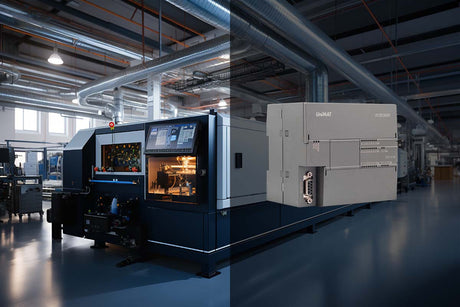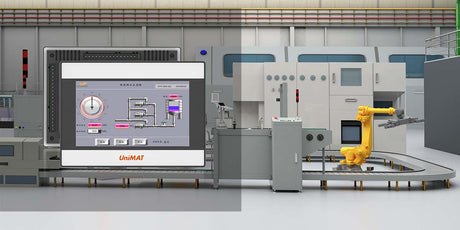In the field of automation control,programmable logic controller(PLC)and distributed control system(DCS)are two core technologies,each carrying different historical missions and application scenarios.Although they are both important components of industrial automation control,they have significant differences in origin,application areas,technical characteristics and redundant design.What is the difference between plc and dcs control system?


1.Origin and Historical Evolution
The birth of PLC is an important milestone in the process of industrial automation.It was originally designed to address the limitations of traditional relay control devices in complex logic control tasks.In the 1960s,Digital Equipment Corporation of the United States developed the first generation of programmable controllers in response to the needs of General Motors(GM),marking the official launch of PLC.With the rapid development of integrated circuit technology and computer technology,PLC has undergone continuous evolution from the first generation to the fifth generation.Its functions have become increasingly powerful and its application areas have continued to expand.The core advantage of PLC lies in its powerful discrete sequential control capability,which makes it perform well in processing switch logic control.
In contrast,DCS was created to meet the needs of continuous process control.The design concept of DCS emphasizes"decentralized control,centralized management"and aims to achieve decentralization of control functions through microprocessor technology to improve the safety and reliability of the system.DCS integrates computer technology,communication technology,CRT(cathode ray tube)display technology and advanced control technology to form a highly integrated automatic control system.This system can not only achieve precise control of the production process,but also realize centralized management and monitoring of data,greatly improving production efficiency and management level.
2.Application fields and scenarios
In terms of application areas,PLC and DCS have their own focuses.With its powerful discrete control capabilities,PLC is widely used in aerospace,steel,tobacco,pharmaceuticals,food,metallurgy,mining,water treatment,transportation and other fields.Especially in some occasions that require frequent switching operations,such as the auxiliary workshop of a power plant,the main control system of a hydropower station,etc.,PLC plays an irreplaceable role.
DCS focuses more on continuous process control,and its main application areas include power generation,petrochemicals,steel,petrochemicals,metallurgy and other industries with a high degree of automation.Especially in the main control units of aerospace,thermal power,nuclear power,large petrochemical,steel and other industries,DCS has become an indispensable control system in these fields due to its high degree of integration and reliability.
3.Technical Features and Programming Methods
From the perspective of technical characteristics,there are significant differences between PLC and DCS in terms of database management,programming language,and signal processing methods.
PLC usually contains two databases:the host computer and the slave computer,which are mainly used for sequential control.Its programming language is mainly based on ladder diagram,which uses logical quantities to judge and output control signals.The host computer usually uses SCADA(Supervisory Control and Data Acquisition)as the control interface to achieve real-time monitoring and management of data.
DCS adopts a unified upper and lower database design,which ensures that data can remain consistent and accurate in all aspects of the system.The lower function blocks of DCS are the main tools for programming,while the upper computer has its own independent view control system control interface.This design makes DCS more efficient and convenient in data processing and monitoring.
In terms of signal processing,PLC manufacturers tend to convert all signals into digital quantities for processing.This processing method simplifies the logical design of the system,but may also lead to the loss of some analog information.DCS focuses more on the processing of analog quantities.It can directly process analog signals from sensors to achieve precise control of the production process.
4.Redundancy Design and System Scalability
In terms of redundant design,PLC and DCS also exhibit different characteristics.The hardware hot standby redundancy mode of PLC usually adopts the configuration of dual racks,dual power supplies,dual processors,and dual network cards,which is equivalent to two sets of hardware equipment redundancy.Although this redundancy method improves the reliability of the system,it also increases the cost of the system,so it is not common in practical applications.
DCS adopts a more advanced hot standby redundant architecture,usually consisting of two integrated DPUs(distributed processing units).This redundancy method not only improves the reliability of the system,but also reduces costs,making DCS more advantageous in application scenarios that require high reliability.
In terms of system scalability,PLC has more advantages in small and medium-sized discrete control work due to its cost advantage of small systems.Especially in SIS(Safety Instrumented System)or ESD(Emergency Shutdown System),PLC has become the preferred controller for these systems due to its flexibility and reliability.
DCS is more like a packaged system,which can be easily configured using corresponding modules.From the perspective of horizontal system scalability,DCS performs very well in terms of convenience and security.However,due to the complexity and high cost of DCS,it is not suitable for use in SIS/ESD systems.

To sum up,PLC and DCS,as the two core technologies in the field of automation control,each has its own unique historical background,application fields and technical characteristics.When choosing which control system to use,comprehensive consideration should be given to factors such as specific application scenarios,control requirements,and cost budget.In the future,with the continuous development of Industry 4.0 and intelligent manufacturing,PLC and DCS will continue to integrate and innovate,bringing more possibilities and opportunities to the field of industrial automation.









